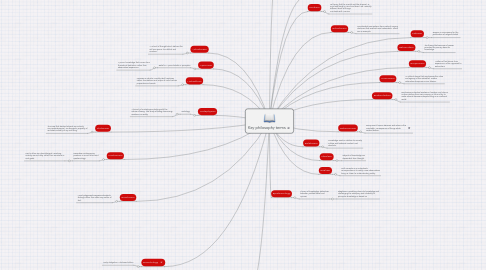Key philosophy terms
作者:Anna Bromely

1. Metaphysics
1.1. Ontology
1.1.1. A branch of metaphysics dealing with the nature of being. The study of being, becoming, existence or reality.
2. Deontology
2.1. Duty, obligation, rule based ethics
3. Metaethics
3.1. Focuses on what is morality itself. Explores status, foundations and scope of moral values, properties and words.
4. Phenomenology
4.1. The study of the structures of experience and consciousness.
5. Apriorism
5.1. Belief in A priori beliefs or principles
5.1.1. A priori: knowledge that comes from theoretical deduction rather than observation/experience
6. Kantianism
6.1. Describes contemporary positions in mind, ethics and epistemology.
6.1.1. Kant's ethics are deontological, revolving entirely around duty, rather than emotions or end goals.
7. Emotivism
7.1. Moral judgements express individuals feelings rather than state any matter of fact.
8. Voluntarism
8.1. A school of thought which defines the will as superior to intellect and emotion.
9. Platonism
9.1. The view that abstract objects are entirely non-spatiotemporal. For example, property of red exists entirely of any red thing.
10. Epistemology
10.1. Theory of knowledge, distinction between justified belief and opinion
10.1.1. Skepticism: Doubting claims to knowledge and challenging the adequacy and reliability of principles knowledge is based on
11. Reletivism
11.1. Knowledge exists in relation to society, culture and historical context. Not absolute.
12. Realism
12.1. Truth consists in an individual’s correspondence to reality. New observations bring us closer to understanding reality
13. Idealism
13.1. Objects of knowledge are dependent from thought
14. Monism
14.1. A view that attributes oneness. The doctrine of unity.
15. Dualism
15.1. Te theory that the mental and the physical, or mind and body or mind and brain, are, radically different kinds of things. Contrasts with Monism
16. Pluralism
16.1. The doctrine of multiplicity. A view whereby multiple things can coexist.
17. Eclecticism
17.1. Constructed new systems from parts of varying doctrines that seemed most reasonable. Stoics are an example
18. Existentialism
18.1. Emphasises individual existence, freedom and choice. Humans define their own meaning in life and try to make rational decisions despite living in an irrational world.
19. Humanism
19.1. An ethical stance that emphasises the value and agency of the individual. Prefers rationalism/empiricism over fideism.
20. Determinism
20.1. Every event, human decision and action is the inevitable consequence of things which existed before.
21. Rationalism
21.1. The theory that exercise of reason provides the primary basis for knowledge.
22. Empiricism
22.1. Matters of fact derive from experience. Often opposed to Rationalism
23. Fideism
23.1. Reason is unnecessary for the justification of religious belief


